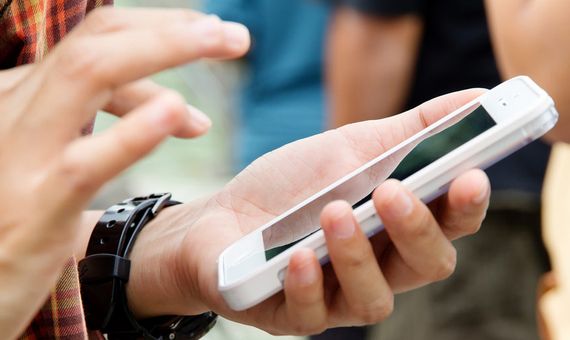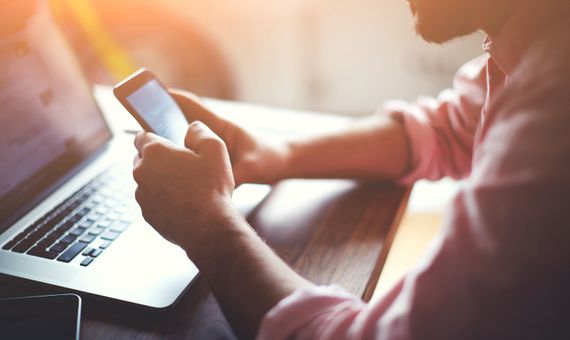The news media often informs us about concerns with regard to the relationship between mental health and the use of social networks. While experts demand more research to better learn how Facebook or Twitter are affecting our minds, several studies have contradicted the idea that these applications are harmful and others point to concrete benefits for some mental illnesses. It has even been shown that social networks can be used to diagnose serious disorders.
Spending hours on social networks can pose risks such as isolation—especially among the youngest users—and in the media it is common to see the word addiction associated with social networks. However, some specialists deny that this disorder exists and instead talk about the possible excessive use of these applications, which can reach an average of nine hours a day among teenagers according to a survey by Common Sense Media.

In an article published by the American Academy of Pediatrics about the principal risks from social networks for this group of young people, doctors identified cyberbullying, sexting—sharing content of a sexual nature—and what they call ‘Facebook depression‘. Although it is not an officially recognized concept, paediatricians say that this type of depression can develop in teens and preteens who spend a lot of time on sites such as Facebook.
In contrast, a study by the University of Wisconsin-Madison (USA) denies this relationship, in view of the results of a survey of 190 students between 18 and 23 years old. Participants had to answer how much time they spent on the Internet and what pages they visited. The survey also included a method to detect depression. The researchers found that the young people spent more than half the time they were connected on Facebook, but found no relationship between the use of social media and the likelihood of depression.
Allies against suicide
Other problems that are often linked to the excessive use of social medial are loneliness and anxiety, but research from the universities of Central Florida and Stetson (USA) concluded that more hours spent interacting on these applications was not linked to poorer mental health.
Through surveys distributed to 467 young people, the scientists found out how much time they spent on social networks, how important they were to the users and how they used them. The researchers also evaluated their mental health, levels of social anxiety, loneliness, decreased empathy and suicidal ideas.
Although in general they found no relationship between time spent on social networks and the different mental health parameters evaluated, they did find an association between those who wrote in a way known as ‘vaguebooking’ and feelings of loneliness and suicidal thoughts.
Vaguebooking refers to unclear and disturbing publications that concern users who read them. Researchers argue that this form of writing can be a sign of more serious problems. Chandler McClellan, a researcher at the Center for Behavioral Health Statistics and Quality, part of the U.S. Substance Abuse and Mental Health Services Administration, tells OpenMind that: “The content of messages could be examined to determine who is at heightened risk of depression or suicide.”

McClellan has conducted an investigation in which they analysed 176 million tweets published from 2011 to 2014 related to depression and suicide. The analysis showed several peaks in the publication of these messages, associated with awareness days such as World Suicide Prevention Day and with events such as the death of Robin Williams.
Is it positive that suicide and depression are talked about on social media? Ryan Mutter, McClellan’s partner and one of the authors of the research, tells OpenMind that: “We currently don’t know if more discussion about suicide and depression is linked with better or worse real world outcomes.” What the scientists highlight is that a message of this type can be used by tweeters and other social media users to support those who need help and to indicate places to go.
Positive for some disorders
Twitter or YouTube can also be positive for people with serious mental disorders such as schizophrenia or bipolar disorder. John Naslund, a researcher in the Department of Global Health & Social Medicine of Harvard Medical School (USA), has analysed how these patients use social networks.
In the case of YouTube, Naslund and his team discovered that patients were using it to feel less lonely, to find hope, and to support and defend themselves. They were also sharing personal stories and strategies to help them cope with day-to-day life.
As for Twitter, patients used it mainly to contact other people who also had a mental disorder, to share their experiences and to learn new strategies for dealing with it.

Although this use is positive, the Harvard researcher stresses that more studies are needed to learn the beneficial and harmful effects of social networks on mental health.
“In general, in our studies participants have described negative aspects of social media, but have mentioned that the benefits of connecting with others outweigh the harms,” Naslund tells OpenMind.
These risks are related to privacy and security, cyberbullying, discrimination, stigma, trolls and any attack that may offend the sensibilities of the user. Another risk is to believe that the lives of others are perfect, in view of what is published in their profiles.
“It’s important for people to keep perspective when using social media and try to focus on the positive benefits of connecting with friends while resisting the urge to compare their lives to others,” McClellan recommends.
Comments on this publication